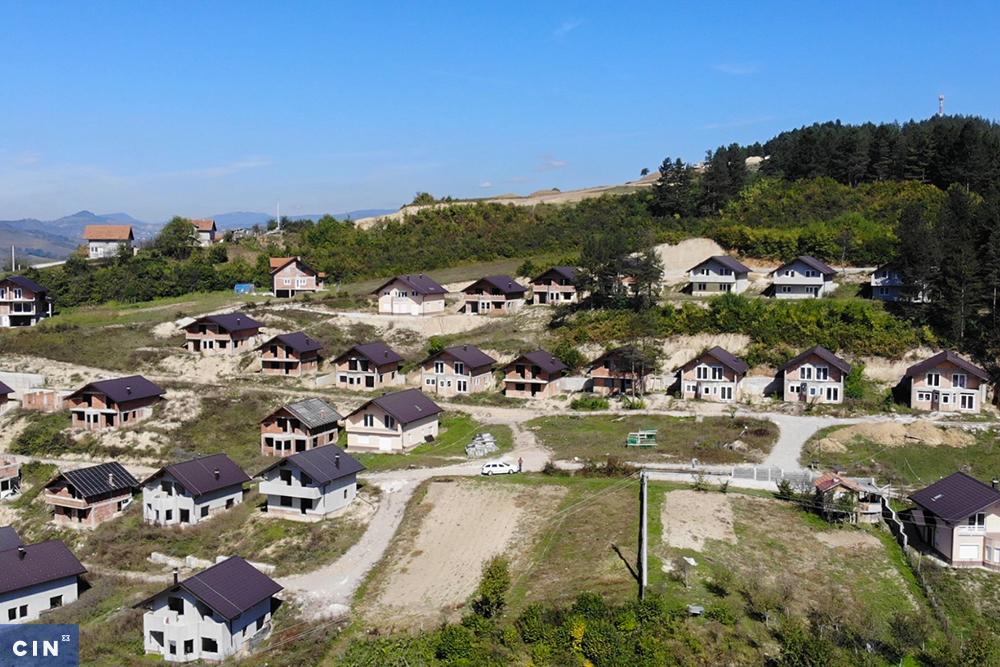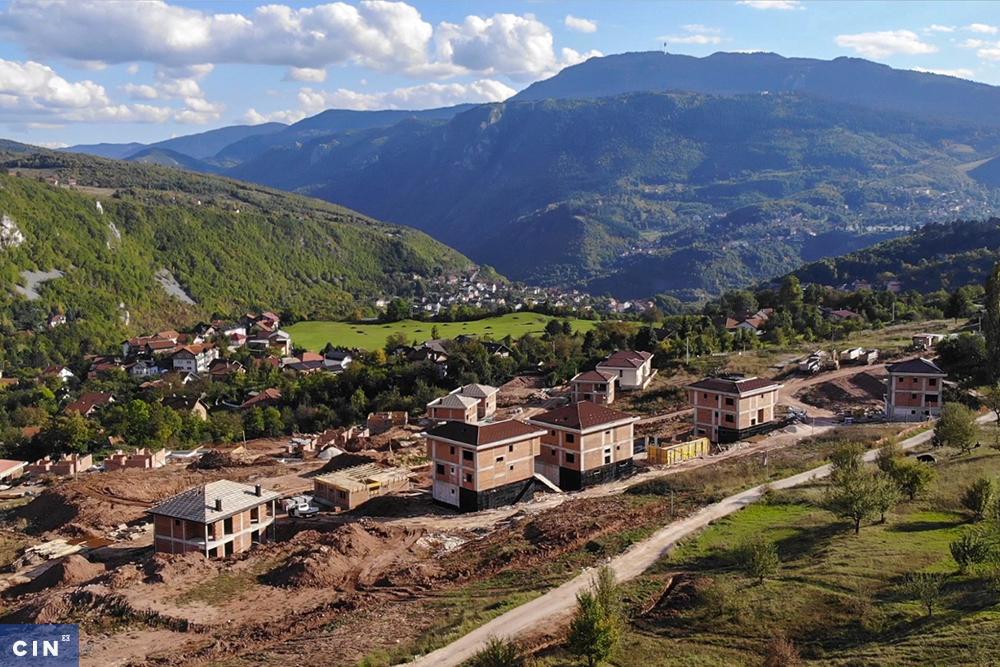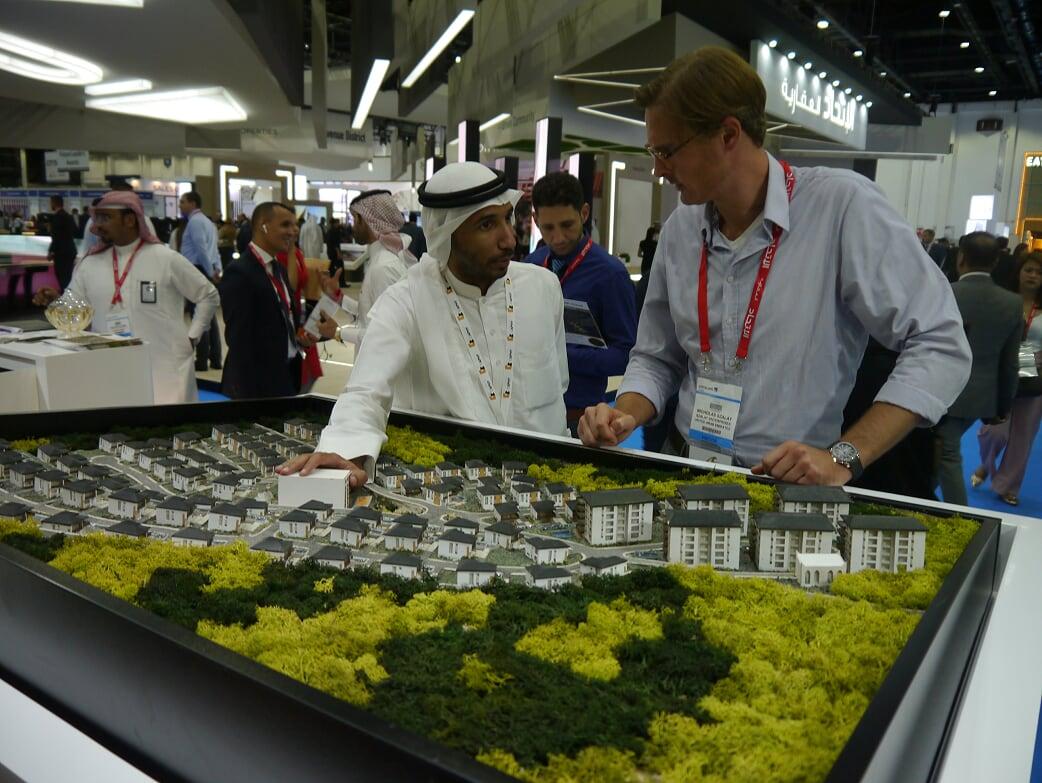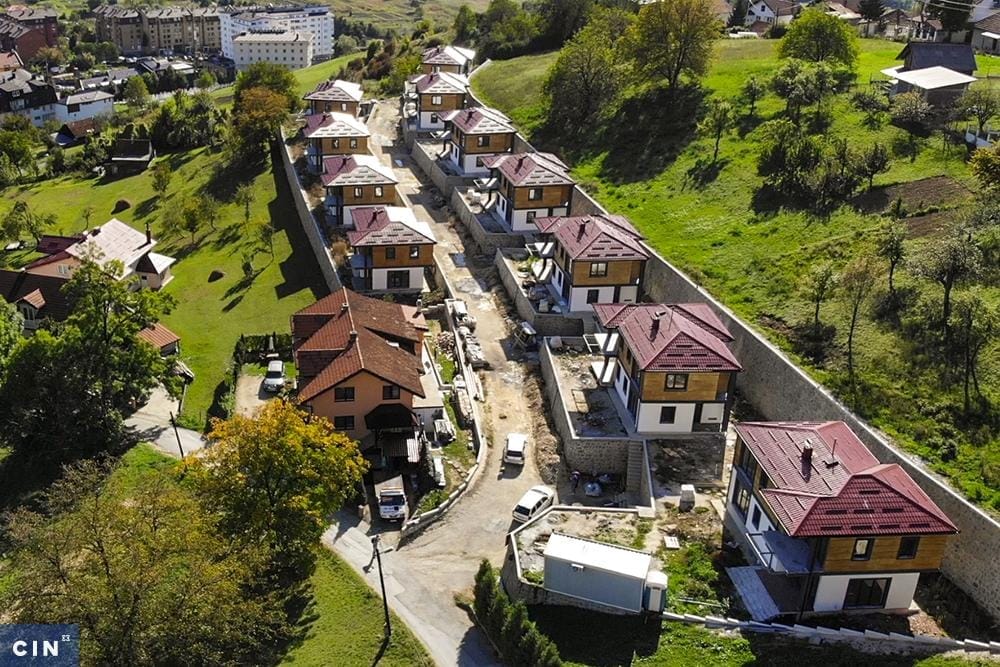In 2018, Arab investors in plain sight illegally built a huge condominium complex for rich Middle East buyers in the Sarajevo municipality of Ilijaš. Authorities looked the other way.
Even though they violated construction regulations that stipulate that illegally built buildings should be knocked over and their investors fined or imprisoned, owners of the complex got away with just a reprimand. Only after most of the planned villas had already been built did authorities intervene.
The Center for Investigative Reporting in Sarajevo (CIN) uncovered that at least five complexes built by Arab and Turkish investors in the Sarajevo metropolitan area covering 133,000 square meters were illegal. They took advantage of weaknesses in the local system and they ignored orders to stop works and knock down buildings. Local authorities could destroy the buildings themselves, but don’t, knowing they are unlikely to recoup costs from the investors. Even in rare court cases brought against illegal constructors, they usually get only minimal fines.
Some local officials say that investors behave this way because local advisors tell them that they will eventually legalize these complexes. However, in 2017 Sarajevo Canton passed a new Law on Spatial Planning which prohibits legalization.

Awaiting Legalization
In November 2017, Ilijaš Municipality adopted a master plan for the condominium complex Sovrle following a request from “Bosnian International for Tourism” (B.I.Tourism) based in Sarajevo but owned by Kuwaiti citizens. The plan calls for 47 housing units a kilometer away from the municipality’s downtown. However, the investors began work without a construction permit. Officials say that they never applied for one.
In May 2018, the municipality construction inspector Vahid Hadžiabdić arrived at the construction site and ordered B.I.Tourism to stop the construction.
“However, since I left on a vacation, they most probably took advantage of this time,” says Hadžiabdić. “Out of the planned 47 facilities they built 37.”
Last September, CIN reporters visited the Ilijaš resort. They found no machines or workers, but nearly all the new buildings had a roof and some had facades, doors and windows.
According to the Sarajevo Canton Law on Inspections, the inspector had to write down minutes before issuing a decision to close a construction site and demolish buildings. He didn’t do this or file a misdemeanor complaint against the investors.
“But If I had known what was going to happen…” said Hadžiabdić about his omissions. “We were waiting for a little while to see if the legalization would come to pass.”
The inspector only submitted minutes 16 months later, after CIN started reporting about the complex. He then informed Ilijaš Mayor Akif Fazlić, who could see the illegal construction from his office window. The mayor blames the inspector.
“If he had been sufficiently involved, probably none of this would have happened. It is what it is,” said Fazlić. He’s not sure what will happen with the complex.
“I ordered the inspector to take stock of the situation and we’ll see later,” said Fazlić. He added that he accepted his part of responsibility, but no sanctions were issued to those involved.

Intimacy for the Rich
Inspectors in the Sarajevo municipality of Old Town similarly did not stop Caphy International from Sarajevo while it was illegally building Saraya Resort in Hladivode neighborhood last summer. The firm is owned by United Arab Emirates citizens. According to the zoning plan, the complex in Hladivode is supposed to feature 93 villas, six buildings, a hotel and a mosque.
“Those residential communities are guarded; basically, this is where well-to-do people pay for intimacy,” said Amela Kulaglić-Herco, zoning assistant to the head of Old Town municipality.
The municipality instructed Caphy International to stabilize the landslide-prone area.
Inspectors say that they did eight inspections over one year, while in July 2019, the municipality officials told CIN reporters that everything was done according to the regulations. At the same time, investors were building 27 villas even though they did not provide any proof of stabilization. By October, 10 villas had roofs, while others were in varying stages of construction.
Since the construction flew under the inspectors’ radar, the head of the Old Town municipality, Ibrahim Hadžibajrić, filed disciplinary proceedings against his assistant for inspection affairs and the inspectors. He also cut their salaries.
In the beginning of October 2019, near the end of the construction season, inspectors issued a decision to close down the site on account of illegal construction. The investor was ordered to demolish six facilities and when only three were down by mid-November officials filed misdemeanor charges in the amount of 91,500 KM against Caphy International.
Company’ representatives twice promised CIN reporters that they would be available for an interview, but they did not.

Resort that Never Was
This is not the first case of illegal resorts in the Old Town. On a slope several hundred meters away from Saraya Resort is an abandoned construction site in the neighborhood of Emirovice. It has an area of 30,000 square meters. Huge concrete retaining walls and fences, buildings under construction, heaps of rubbish and construction debris testify to attempts to build The Dema Resort that was supposed to include a five-star hotel, two apartment buildings, 26 villas, a mosque and a supermarket.
Meanwhile, the same investor, The First Star from Sarajevo, tried to build a five-villa complex several hundred meters away in the Brusulje neighborhood. The firm’s owner, from Qatar, didn’t respond to reporters’ messages and no one could be found at the firm’s address.
Zoning and construction inspection of the Old Town municipality visited the illegal construction sites on several occasions after the beginning of construction in 2016. It demanded that the investor stops construction and pull the workers and the machines. In the same year, The First Star failed to win a zoning permit, because these plots were not intended for construction in the Sarajevo Canton Master Plan. On top of this, the land in Emirovice is zoned agricultural, while the plots in Brusulje are located in a landslide area.

Work continued, however, through mid-2017, when inspectors again visited. They encountered machines and workers putting up a concrete fence, retaining walls and building foundations, while three houses were being built at Brusulje.
Even though inspector Haris Srna told CIN that there have been no further activities on construction of the Dema Resort since August 2017, the neighborhood’s secretary Remza Čoko informed the inspection that October about works on the site saying that excavated stones and debris were thrown out on an adjacent plot and forest was destroyed.
During 2016 and 2017, the inspection announced that it would issue demolition orders for both sites, but did nothing. The inspectors told CIN first that they did not because there was no one to serve the orders at the firm’s registered addresses. Several months later, Srna explained that the municipality didn’t do it because it was not in its interests.
“They were not going to do it. While we with our money and excavators…we have no interest to dig up someone’s private meadow near the inter-entity border,” said Srna. Thus, inspection made it possible for The First Star to continue working at the earliest opportunity.
The Sarajevo Canton Forest Authority did not look for excuses to act and in October 2017 it reported The First Star on account of illegal logging and building a road on the plot of the Dema Resort. A year later, the Municipal Court in Sarajevo fined The First Star 12,000 KM.

Solaris – Castles in the Sky
Sarajevo Canton banned the legalization of illegal construction four years ago.
The last approved legalization took place in Jan 2016. A year later the new Law on Spatial Planning in Sarajevo Canton was adopted which abolished that possibility.
“They can neither legalize it, nor connect buildings to the power network, which is the most important thing for them,” said Meliha Avdibegović, the assistant for spatial planning and environmental protection to the head of Iijaš municipality.
Even though two petitions were filed with the Cantonal Assembly to amend the Law to allow legalization of illegal construction, the Cantonal government’s officials said that no changes to the law have been considered.
Foreign investors also ignored demolition ordinances in Vogošća municipality. Since construction began in the spring of 2017, inspectors several times closed an illegal construction site in Solaris complex because Turkish investor Hayri Genc had no construction permit and never applied for it.
For this reason, inspectors first issued several demolition ordinances and then filed misdemeanor and criminal charges against Genc, but he did not care. Over several months he built 11 houses.
“They literally did them out of concrete. During the weekend they poured concrete into molds for all 11 ceilings. Then they closed those walls,” chief municipal inspector Sehad Zeković told CIN. He said building with bricks takes more time. Workers would show up on the weekends to throw debris into the concrete slabs. “Come the weekend, on Saturday they’d erect a floor: bang, bang!” said Zeković.
He said he first closed the site in August 2017 and ordered the demolition of concrete retaining walls that are 250 meters long. Three months later, in the subsequent inspection, Zeković came across 11 houses built up to the first floor. His colleague Mirza Riđanović encountered workers building roofs six months later. Each time, both closed the construction site and ordered demolition.
“As soon as we closed them, they stopped work. Come the weekend, they continued with work,” said Riđanović. “I cannot get tied down to this construction site alone. I have thousands of other duties to attend to.” In mid-2018, he issued an ordinance that allowed the municipality to demolish Genc’s complex.
This has not yet happened because the municipality would have to contract a firm to raze buildings and clear debris. Afterxwards, the municipality would have to recoup those costs from the investor.

“Who do you send a bill to when the man is not there,” said Riđanović.
On his LinkedIn profile Genc wrote that he was a regional director of a Turkish firm Black Sea International which was marketing and selling houses in Solaris. Last year, inspectors did not know Genc’s whereabouts so they asked the Service for Foreigner’s Affairs, in charge of monitoring the stay of foreign citizens in BiH, for help. However, the officials did not have Genc in their registers.
The investor and construction workers, though, did not lose time. In mid-2018, the inspectors encountered them working on the interior design of the houses, so Riđanović took another step and filed a criminal complaint.
The inspectors had already filed two misdemeanor complaints against him on account of illegal construction. Because he didn’t heed the inspection’s orders he was fined 10,000 KM as the Court considered that the minimal punishment was adequate to the gravity of the infraction.
The Sarajevo Canton Law on Spatial Planning stipulates between a 10,000 KM and 50,000 KM fine for firms. Investors building without a permit may be criminally prosecuted and sentenced to between three and 12 months in prison.
None of the constructors has so far been prosecuted and the courts handed down minimal sentences for illegally built complexes.
Inspectors Riđanović and Zeković said that they didn’t expect much from the justice system because the lenient sentences do not discourage investors from illegal construction.









